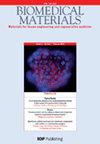镁离子刺激巨噬细胞衍生的外泌体抑制血管生成
IF 3.7
3区 医学
Q2 ENGINEERING, BIOMEDICAL
引用次数: 0
摘要
血管生成是骨修复和再生成骨的必要前提,可通过巨噬细胞的免疫调节介导。镁及其合金是一种很有前途的生物可降解骨植入材料,其降解产物(镁离子)可以影响巨噬细胞的免疫调节。然而,巨噬细胞源性外泌体在镁离子刺激下的免疫调节机制尚不清楚。在本研究中,10-50 mM镁离子以剂量依赖的方式抑制巨噬细胞的活力和增殖,但高浓度会导致巨噬细胞凋亡。镁离子刺激巨噬细胞分泌的外泌体抑制内皮细胞的血管生成,表现为细胞活力、增殖、迁移和管形成受到抑制,至少部分原因是外泌体介导的内皮一氧化氮和血管内皮生长因子的下调。本文的研究结果表明,必须从巨噬细胞来源的外泌体的免疫调节角度来考虑可生物降解镁合金的生物功能。我们的研究结果还提示通过抑制肿瘤相关血管生成来治疗癌症。本文章由计算机程序翻译,如有差异,请以英文原文为准。
Exosomes derived from magnesium ion—stimulated macrophages inhibit angiogenesis
Angiogenesis, an essential prerequisite to osteogenesis in bone repair and regeneration, can be mediated by immunoregulation of macrophages. Magnesium and its alloys are promising biodegradable bone implant materials and can affect immunoregulation of macrophages by the degradation products (magnesium ions). Nevertheless, the mechanism of macrophage-derived exosomes stimulated by Mg ions in immunoregulation is still not well understood. Herein, 10–50 mM magnesium ions are shown to inhibit the macrophage viability and proliferation in a dose-dependent manner, but a high concentration results in macrophage apoptosis. The exosomes secreted by macrophages from magnesium ion stimulation inhibit angiogenesis of endothelial cells, as manifested by the suppressed cell viability, proliferation, migration, and tube formation, which arise at least partially from exosome-mediated downregulation of endothelial nitric oxide and the vascular endothelial growth factor. The findings reported in this paper suggest that the bio-functionality of biodegradable magnesium alloys must be considered from the perspective of immunoregulation of macrophage-derived exosomes. Our results also suggest potential cancer therapy by inhibiting tumor-associated angiogenesis.
求助全文
通过发布文献求助,成功后即可免费获取论文全文。
去求助
来源期刊

Biomedical materials
工程技术-材料科学:生物材料
CiteScore
6.70
自引率
7.50%
发文量
294
审稿时长
3 months
期刊介绍:
The goal of the journal is to publish original research findings and critical reviews that contribute to our knowledge about the composition, properties, and performance of materials for all applications relevant to human healthcare.
Typical areas of interest include (but are not limited to):
-Synthesis/characterization of biomedical materials-
Nature-inspired synthesis/biomineralization of biomedical materials-
In vitro/in vivo performance of biomedical materials-
Biofabrication technologies/applications: 3D bioprinting, bioink development, bioassembly & biopatterning-
Microfluidic systems (including disease models): fabrication, testing & translational applications-
Tissue engineering/regenerative medicine-
Interaction of molecules/cells with materials-
Effects of biomaterials on stem cell behaviour-
Growth factors/genes/cells incorporated into biomedical materials-
Biophysical cues/biocompatibility pathways in biomedical materials performance-
Clinical applications of biomedical materials for cell therapies in disease (cancer etc)-
Nanomedicine, nanotoxicology and nanopathology-
Pharmacokinetic considerations in drug delivery systems-
Risks of contrast media in imaging systems-
Biosafety aspects of gene delivery agents-
Preclinical and clinical performance of implantable biomedical materials-
Translational and regulatory matters
 求助内容:
求助内容: 应助结果提醒方式:
应助结果提醒方式:


